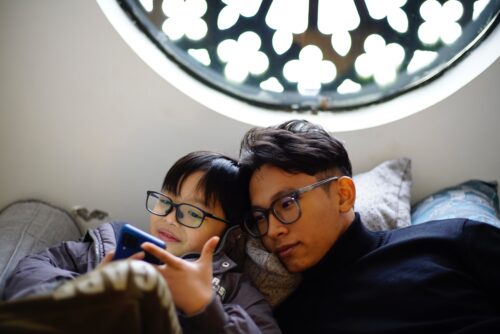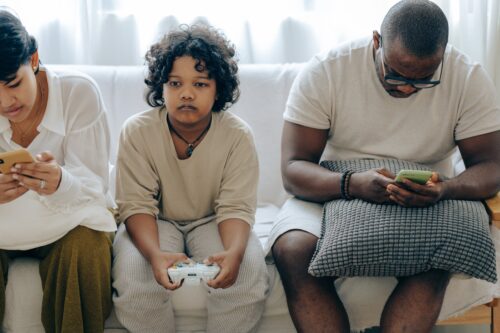In an age where digital connections often outpace face-to-face interactions, the role of social media in shaping family relationships has become a topic of keen interest and debate. It’s a world that intertwines the instantness of modern communication with the timeless complexity of family dynamics. This article aims to unravel the effects of these new forms of social media on family relationships, exploring how it can both bridge distances and create emotional gaps.
As we navigate through the nuanced pathways of online interactions, we question: does social media brings us closer as a family, or does it silently drift us apart?

Positive Effects Of Social Media On Family Relationships
When it comes to modern family dynamics, social media emerges as a vibrant thread, weaving together connections that transcend physical boundaries and time zones.
Its influence in enhancing family relationships is undeniable, offering a multitude of positive impacts. From bridging long distances to nurturing a sense of belonging, social media can play a pivotal role in maintaining and strengthening familial bonds.
Let’s explore how these digital platforms are positively reshaping the way families interact, share, and grow together.
Enhanced Communication Across Distances
Social media has revolutionized the way families communicate, especially when separated by distance. It makes it easier for family members to stay connected regardless of geographical barriers, offering a dynamic platform for:
- Instant messaging
- Video calls
- Sharing updates
The ability to share daily experiences, from significant milestones to mundane activities, helps maintain a sense of closeness and involvement in each other’s lives.
Sharing Milestones And Memories
Social media acts as a digital scrapbook (like Facebook!), where families can share and celebrate key moments. Birthdays, graduations, anniversaries, and even small victories can be shared in real time, allowing distant relatives to partake in these celebrations.
This shared experience fosters a sense of unity, family connection, and belonging, keeping the family bond strong despite physical distances.
Support Networks And Community Building
Social media provides families with access to broader support networks, connecting them with other families and communities. These platforms offer spaces where families can:
- Seek advice
- Share experiences
- Find solace in knowing others face similar challenges
This sense of community can be particularly empowering for families dealing with specific issues, such as raising children with special needs or navigating health crises.
By sharing their thoughts, feelings, and experiences on social media, family members can develop a deeper understanding and empathy for each other.
This digital window into each other’s lives can lead to more meaningful offline conversations, as family members gain insights into the daily struggles and joys that they might not otherwise be privy to.
Negative Effects Of Social Media On Family Relationships
While social media can be a boon for family relationships, it’s not without its pitfalls. The digital world, with all its allure and immediacy, can sometimes cast a shadow over family dynamics.
As much as it can connect, it also has the potential to create divides, leading to a range of negative effects on family relationships. From diluting the quality of personal interactions to fostering miscommunication, the challenges posed by social media in the family context are multifaceted and significant.

Let’s delve into the less discussed, yet equally important, downside of social media’s impact on family life.
Distraction, Reduced Face-To-Face Interaction, And Miscommunication
One of the most significant downsides of social media is the way it can detract from face-to-face family time.
The allure of screens can lead family members to spend time interacting with their devices more than spending time with each other, leading to a decline in quality family interactions, such as less time spent having dinner at the dinner table, is a sense of disconnection within the household.
Furthermore, the lack of non-verbal cues and the potential for misinterpretation in digital family communication can lead to misunderstandings within the family. Comments or messages that are intended to be humorous or supportive can be misconstrued, potentially causing conflicts and hurt feelings.
Online Risks And Privacy Concerns
Social media usage comes with risks like exposure to:
- Inappropriate content
- Cyberbullying
- Privacy violations
Family members, particularly younger ones, may not always be aware of the implications of sharing personal information online. This can lead to concerns of the safety and privacy of a person, creating tension and worry within the family.
The Pressure Of Social Comparison
Social media often presents an idealized version of life, which can create unrealistic expectations and pressures.
Family members, especially adolescents, may compare their own lives to the seemingly perfect lives displayed online, leading to feelings of inadequacy, jealousy, or dissatisfaction within the family context.
Balancing Social Media Use In Family Life
Balancing social media use within the family is akin to walking a tightrope: it requires careful navigation to avoid the pitfalls of excess while harnessing its positive aspects.
In a world where digital devices are ubiquitous, establishing a healthy balance between family rules and a harmonious relationship with social media is essential for maintaining healthy family dynamics.
1. Setting Boundaries And Limits
One of the key strategies in balancing social media use is setting clear boundaries. This can involve:
- Designated ‘no-device’ times, such as during family meals
- ‘Digital curfews’ where all family members agree to disconnect from their devices by a certain time in the evening
These practices help in reclaiming quality family time and reducing the interference of digital distractions in personal interactions.
2. Creating A Family Media Plan
Families can benefit from creating a media plan that outlines how, when, and where social media can be used. This plan should be tailored to the family’s unique needs and lifestyle, taking into consideration:
- The age of children
- Parental work schedules
- Important family activities
A family media plan helps in establishing a shared understanding and sets a standard for responsible social media use.
3. Encouraging Healthy Social Media Habits
Promoting healthy habits around social media use is crucial. This includes encouraging mindful scrolling, where family members are conscious of the time they spend on technology, social media and the content they consume. It’s about fostering an environment where social media is used to enhance life, not escape from it.
This also means being aware of and discussing the impact of social media on mental health and helping other family members understand the importance of consuming content that is positive and uplifting.

4. Open Communication And Education
Open communication about the benefits and risks of social media is vital. This involves educating children about online safety, privacy, and the importance of critical thinking when engaging with content online.
Parents can lead these discussions by sharing their own experiences and encouraging their children to talk about their social media use, creating an atmosphere of trust and openness.
5. Role Modeling By Parents
Parents play a crucial role in setting the tone for social media use within the family, as it can impact family relationships. By modeling balanced social media habits, parents can demonstrate to their children the importance of prioritizing real-world interactions and interpersonal relationships over online ones.
This includes:
- Showing restraint in their own use of devices
- Being fully present during family time
- Sharing their strategies for managing digital well-being
6. Customizing Social Media Use To Fit Family Values
Each family is unique, and so should their approach to social media. Customizing the use of these platforms to align with family values and goals is important. This might mean using these social media tools primarily for:
- Keeping in touch with extended family
- Educational purposes
- Sharing family achievements and milestones
The Role Of Parents In Guiding Social Media Use
In the digital era, guiding children through the complexities of social media is a critical responsibility for parents. This involves educating them about online safety, fostering critical thinking, and setting a positive example in their own social media use.
- Educating On Online Safety And Privacy: Parents must teach their children about the importance of online privacy, including the risks of sharing personal information and interacting with strangers.
- Fostering Critical Thinking: Encouraging children to question the authenticity of online content and recognize biased information is essential for developing digital literacy.
- Modeling Healthy Social Media Habits: Children often mirror the behavior of their parent. Parents should demonstrate balanced social media usage, emphasizing the value of real-world interactions over digital ones.
- Open Dialogue And Trust: Maintaining open communication about online experiences is vital. This approach fosters trust and encourages children to share their digital challenges with their parents.
- Monitoring And Guidance: While respecting family privacy, parents should have a general awareness of their children’s online activities, especially for younger kids, ensuring they engage with age-appropriate content.
- Support And Intervention: Parents should be ready to support and intervene if social media negatively impacts their child’s well-being, possibly limiting access to certain platforms or seeking professional help.
To Wrap Up
In the intricate dance of social media and family relationships, we find a world rich with opportunities and surrounded by challenges. This digital age has redefined the way families communicate, share, and connect, offering unprecedented avenues for bonding while also presenting unique hurdles. As we step into the future, it becomes increasingly clear that the key to harmonious family relationships in the era of the internet and social media lies in balance.
It’s about embracing the connective power of these platforms while paying attention of their potential to distract and disconnect. In the end, social media, like any tool, depends on how we use it. Used mindfully, it can be a bridge to strengthen family bonds; used carelessly, it can become a barrier to family relations. The choice, as always, remains in our hands, or perhaps more aptly, in our clicks and swipes.
Frequently Asked Questions (FAQ)
How social media affects family relationships?
What are the importance of social media in your family?
How is social media affecting the relationships of people?
How does social media change our relationship with other persons in our family and outside our family?
How does media affect your family?
How does media affect family life?
How does social media affect the relationship between parents and children?
How does social media affect communication in families essay?
How does social media affect the relationship between parents and children essay?
How do the social media affected communication among friends and family?
What is the positive impact of the media on values and beliefs about relationships?
How do healthy family relationships affect members of a community?
What is the negative impact of social media on families?
How does social media affect relationships positively?
How is social media responsible for family disputes?
